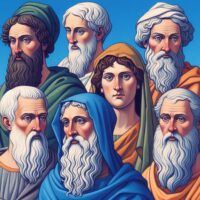The aphorism, from the Greek: ἀφορισμός / aphorismós (“delimitation”), from the verb ἀφορίζειν / aphorízein (“to define, to delimit”), is a statement expressed in a few words—and by extension, a sentence—that summarizes a principle or seeks to characterize a word or a situation from a singular perspective. In some respects, it may appear as a figure of speech when its use aims for rhetorical effects.
Definition
Linguistic Definition
The aphorism is a self-sufficient statement. It can be read, understood, and interpreted without recourse to another text. An aphorism is a thought that permits and incites other thoughts, which clears a path to new perceptions and conceptions. Even if its formulation seems to take on a definitive appearance, it does not claim to say everything or to say everything about a thing.
The aphorism, although resembling other declamatory forms such as the proverb or the maxim, should not be confused with them. Indeed, the aphorism is based on antithetical propositions, unlike the maxim that stages the paradox.
The aphorism is thus close to figures of speech such as contradiction, symmetry, parallelism, or even antithesis. However, the aphorism is formally close to the maxim: based on the copula of the verb “to be” and on comparison or analogy.
The aphorism aims for the peremptory (the aphorism adopts assertion), presenting itself as an authoritative and closed statement (Maurice Blanchot calls it limited), employing all the gnomic processes: depersonalizations (infinitives, indefinite pronouns, third person notably), especially the present tense of general truth characteristic of the proverb and giving the statement a general scope.
Stylistic Definition
The author remains somewhat detached from his intellectual production, not hesitating to contradict himself, not producing the truth or his truth, but seeking it. One of the most famous examples of an aphorism author from this point of view is Lichtenberg. It is also possible to think of a part of Nietzsche’s work as that of Gustave Thibon, strongly inspired by the latter in his approach. In this regard, Nietzsche sees it as an attempt to understand oneself, which Montaigne also emphasized; the German philosopher expressed it thus in his journals:
“I was seeking my heaviest burden, / It is myself that I found.”
The author is also struck by the aesthetic scope of aphorisms, which “strike by their tendency towards poetry.” In other words, the aphorism is supposed to convey with conciseness extensive and varied knowledge.
Not every quotation taken out of context is necessarily an aphorism. An aphorism is already a fragment of writing before being reused or quoted. That said, a quotation sometimes becomes an aphorism or a proverb through the erasure of the context (source and author).
If the aphorism, adage, saying, or maxim all state a general principle, they are distinguished in this: the adage and the saying claim to state proven truths and laws and have a more anonymous character; the maxim has a moral connotation. They thus have a sententious character. Conversely, an aphorism is a trait of the mind that presents a more descriptive, spiritual, or even paradoxical character.
The suggestive power of aphorisms is also linked to their conciseness, unlike proverbs and maxims: the aphorisms of Hippocrates, such as the famous “Ars longa, vita brevis” (“Art is long, life is short”), or those of Buddha and Lao Tzu, are among the most representative.
Sometimes the aphorism takes on pompous traits and the term is then used as a synonym for “banal sentences,” taken in a pejorative sense.
According to Dominique Noguez, “the aphorism:
has a particular structure,
is like a difficult magic trick to pull off,
is like a puzzle piece, but
bears bad company poorly,
seeks universality more than originality,
conciseness more than simplicity,
is often bitter, and
is unloved.”
Concerned Genres
Aphorisms are primarily a rhetorical and argumentative genre. That’s why it has been the preferred mode of expression for moralists like Jean de La Bruyère, whose “Les Caractères” are punctuated, alongside long portraits and ethopoeias, with short sentences. Nietzsche, in the treatise “Human, All Too Human,” argues that the aphorism must be decoded by the reader, as if it contained a subliminal or hidden message; he speaks of the necessity of having “a slow reading” or what he calls “a rumination.
“
But it is the French moralists, especially La Rochefoucauld and Vauvenargues — referred to as “aphorists” — who consecrate the aphorism and even make it a literary genre. The first of these authors, in his “Sentences et maximes de morale” (1634), argues that it is an exercise in introspection intended to analyze self-love.
Poetry also utilizes the suggestive resources of aphorisms. Some texts and argumentative essays thereby acquire a poetic significance: those of Emil Cioran, for example, or even Nietzsche, seem to focus solely on the images created by aphorisms at the expense of reasoning. Cioran defines it as the “axiom of twilight” because it allows one to delve into the depths of existence. La Rochefoucauld already saw it as a literary means of denouncing self-love. René Char forms short poems where each line is an aphorism. One can also mention haikus, which are the structured and Japanese counterpart of aphorisms.
The poet Marc Alyn gathers aphorisms in his “Carnet d’éclairs”: “Before the storm, bring in the wheat of speech”; or: “Speech kills the things it designates, but this murder makes them exist.
” In a very similar spirit, Ferenc Rákóczy starts from fragments of sentences given between dream and waking state to transcribe them into meteoric and striking sentences: “Marry infinity, marry a cactus” (In the nut of the world).
The novel also formulates aphorisms. Honoré de Balzac, in his “Physiologie du mariage,” includes a section called Aphorisms where he offers young people definitions of the “honorable woman.”
The Oulipo and the “machine for making aphorisms” by Marcel Benabou sought to sequence and automate the formation of aphorisms: it was a matter of combining a limited number of terms to create paradoxical aphorisms quasi-infinitely from a reduced number of predefined syntactic structures.
History of the Notion
The Greek physician Hippocrates formulates what can be designated as the first collection of aphorisms in the eponymous work “Aphorisms” through maxims that still exist today, such as “To the greatest evils the greatest remedies.” The term is used for the first time in the form of “aforisme” (pronounced “aforîme”) in Henri de Mondeville’s “Chirurgies” in 1314.
Rabelais, during the Renaissance, employs the modern term for the first time in the “Cinquième Livre”: “For then he held a map of the world and briefly explained it to them with small aphorisms, and they became clear and learned in a short time, and spoke elegantly of prodigious things by good memory, for the hundredth part of which knowing would not suffice the life of man.”
The Le Robert dictionary defines aphorism as: “a concise formula or prescription summarizing a theory, a series of observations, or containing a precept.”
Examples
General Aphorisms
- “It is not necessary to hope in order to undertake, nor to succeed in order to persevere.” (Charles the Bold, later echoed by William of Orange)
- “Everything must change for everything to remain the same.” (Giuseppe Tomasi di Lampedusa)
- “It’s not the children on the back seat who cause accidents, but accidents on the back seat that cause children.” (Pierre Dac)
- “Knowledge without conscience is only the ruin of the soul.” (Rabelais)
- “The absent are always wrong to return.” (Jules Renard)
- “The sun shines for everyone.” (Paul Éluard)
- “Money does not bring happiness to the poor.” (Coluche)
- “Life! What a wonderful absurdity.” (Daniel Desbiens)
- “There is no wealth but men.” (Jean Bodin)
- “We love a woman for what she is not; we leave her for what she is.” (Serge Gainsbourg)
- “Too much trust breeds distrust.” (Gaëtan Faucer)
- “To kill time is only self-defense.” (Marc Brillat-Savarin)
Moral Aphorisms
- “All the virtues of men are lost in self-interest as rivers are lost in the sea.” (La Rochefoucauld)
- “Everything has been said, and one comes too late, since there have been men for seven thousand years, and they have been thinking.” (La Bruyère)
- “True eloquence consists in saying everything that is necessary, and only saying what is necessary.” (La Rochefoucauld)
- “What does not kill me makes me stronger.” (Nietzsche)
- “I sought great men, and I found only men imitating their ideal.” (Nietzsche)
- “Generosity is not measured by what one gives, but rather by what one expects in return.” (Leonid Soukhoroukov)
- “The other is not only different from you, but also differently than you imagined.” (Ferenc Rákóczy)
- “To accomplish great things, we must live as though we were never to die.” (Vauvenargues)
- “War, a massacre of people who do not know each other, for the profit of people who know each other but do not massacre each other.” (Paul Valéry)
Poetic Aphorisms
- “The poet depends on the world like the flower on its stem. He spends his life seeking balance, distributing his weight, and it is from this juggling exercise that images are born, these movable bridges thrown over the abyss.” (Ferenc Rákóczy)
- “On the holy mountain where the azure settles, Love creates a body that fire binds in gold.” (Emmanuel d’Hooghvorst)
- “There is no more fabulous vessel than the bed of a sleeping child.” (Marc Brillat-Savarin)
Legal Aphorisms
- “Taxes are the price we pay for a civilized society.” (Oliver Wendell Holmes, Jr.)
Famous Aphorism Authors
- Sacha Guitry
- Paul Gordeaux
- Rabelais
- Serge Gainsbourg
- Jean-Paul Sartre
- Friedrich Nietzsche, especially in “Beyond Good and Evil”
- Montaigne in the “Essays”
- François de La Rochefoucauld in his “Reflections or Moral Maxims”
- François Rollin in “Rollinettes”
- La Bruyère in “The Characters”
- Louis Ferdinand Céline, in “Journey to the End of the Night”
- Emil Cioran
- Joseph Joubert
- Vauvenargues
- Sébastien-Roch Nicolas de Chamfort
- Antoine Rivarol
- Marc-Edouard Nabe
- G. K. Chesterton
- Georg Christoph Lichtenberg
- Paul Valéry
- Oscar Wilde
- Louis Scutenaire
- Achille Chavée
- Henri Michaux
- Malcolm de Chazal
- Lao-Tseu
- Arthur Schopenhauer, Aphorisms on the Wisdom of Life
- Jean Anthelme Brillat-Savarin, illustrious French gastronome who formulated 20 aphorisms focused on the art of gastronomy
- George Sand, “Women are raised like saints and treated like fillies.”
- Johann Heinrich Füssli, in “Aphorisms, Mainly Related to Fine Arts”
- Ludwig Wittgenstein, in “Tractatus Logico-Philosophicus”
- Sylvain Tesson
- Ylipe
- Elias Canetti
- Xavier Forneret, from “Untitled” to “Brushwood of Thought”
- Oliver Wendell Holmes, Jr.
- Ambrose Bierce, in his “Devil’s Dictionary”
- F. W. J. von Schelling, Aphorisms for Introduction to the Philosophy of Nature and Aphorisms on the Philosophy of Nature





















